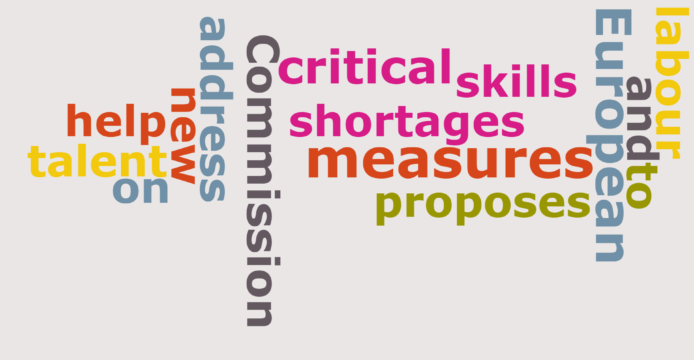he 15th November, the European Commission presented a series of new initiatives in a Skills and Talent Mobility package to make the EU more attractive to talent from outside EU, and to facilitate mobility within. These measures include a new EU Talent Pool to match employers in the EU with jobseekers in third countries as well as measures to promote the recognition of qualifications and learner’s mobility. They come as key deliverables of the European Year of Skills.
Skills shortages persist across the EU, in a range of sectors, and at various skills’ levels. The EU’s drive to fill labour shortages starts at home: with relentless efforts to upskill, reskill and use the untapped potential of the EU’s domestic workforce to the benefit of the single market. But to address the shortages the Member States are facing; the EU will also need to attract skills and talent from all around the world. For this approach to be successful, the EU must be able to attract and retain the needed talent.
Making recruitment from outside the EU easier
The Commission is proposing to establish an EU Talent Pool to help employers access an EU-wide pool of skills and talent. Participation in the EU Talent Pool will be voluntary for Member States, who will support the management of the platform. It will also provide information on recruitment and migration procedures in the Member States and includes strong safeguards to ensure fair recruitment and working conditions. Information to the Talent Pool: https://home-affairs.ec.europa.eu/regulation-establishing-eu-talent-pool_en
The EU Talent Pool will additionally support the implementation of Talent Partnerships. These are tailor-made partnerships with non-EU countries, providing mobility for work or training. Jobseekers who have developed their skills under a Talent Partnership will receive a Talent Partnership Pass that certifies their qualifications. The opportunities for legal migration can be expected to disincentivize irregular migration and must go hand in hand with strengthened cooperation.
Easier and faster recognition of qualifications gained in third countries
The Commission is recommending a set of measures to simplify and speed up the recognition of skills and qualifications of third country nationals. These measures would modernise the EU’s current recognition system and bring it closer to the system established for EU nationals that move to another Member State.
The aim is to develop the capacity of national recognition authorities to simplify and expedite procedures by improving comparability of third country qualifications and of how to assess jobseekers’ skills. This will allow for recognition decisions to be taken quickly and with confidence to fill vacancies in EU shortage occupations, in particular in priority regulated professions.
Background
The talent mobility package follows up on the 2022 State of the Union address of the Commission’s President, which highlighted challenges linked to the recognition of qualifications of third country nationals that are often a practical disincentive for legal migration. It builds on work under way with the Skills and Talent package, the New Pact on Migration and Asylum and contributes to the current European Year of Skills with its focus on a strategic approach to solving labour and skills shortages.

